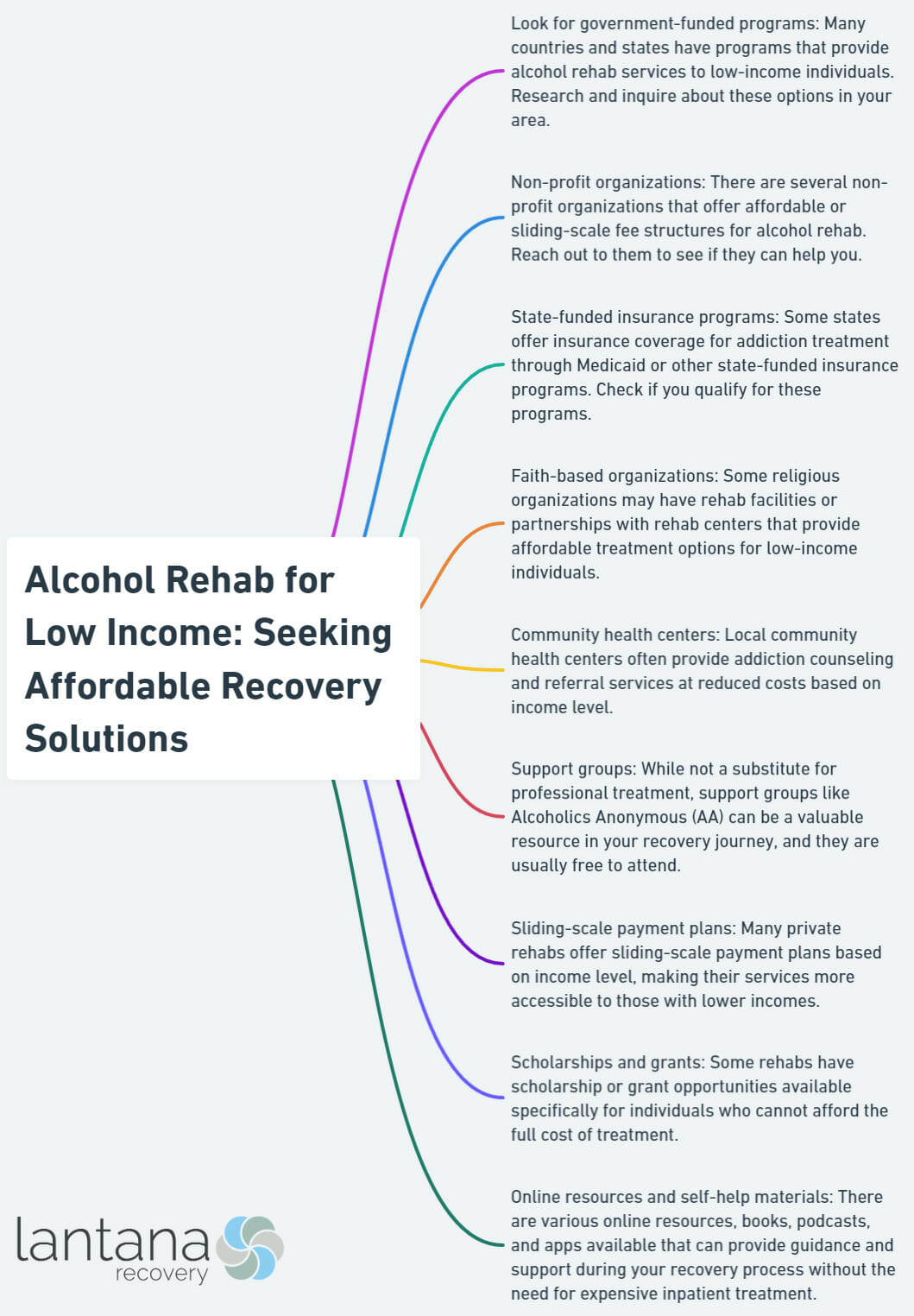Alcohol addiction does not discriminate based on income, and individuals with low income often face unique challenges when seeking treatment and recovery options. Understanding the need for alcohol rehab for low-income individuals is crucial in addressing the barriers they face in accessing the care they need.
Affordable recovery solutions play a critical role in helping individuals overcome their addiction and achieve lasting sobriety. By eliminating financial barriers to treatment, individuals can receive the support they need to break the cycle of addiction and poverty.
There are different types of alcohol rehab programs available for low-income individuals that cater to their specific needs and financial limitations. State-funded or non-profit rehabilitation centers, sliding scale payment programs, and Medicaid and insurance coverage are some of the options that provide affordable treatment options.
Finding affordable alcohol rehab options requires research and exploration of local resources and assistance programs. Contacting helplines and hotlines can also provide valuable information and guidance. Seeking support from community organizations can connect individuals with additional resources and financial assistance opportunities.
In addition to affordability, low-income individuals seeking alcohol rehab should also consider factors like transportation and accessibility. Finding treatment options that are within reach and offer flexible schedules or telehealth services is essential for their successful recovery journey.
By understanding the need for alcohol rehab for low-income individuals and exploring affordable recovery solutions, individuals can take the first step towards a healthier, sober life. With community support and access to necessary resources, recovery becomes a more accessible and attainable goal for everyone, regardless of their income level.

Understanding the Need for Alcohol Rehab for Low Income Individuals
Understanding the need for alcohol rehab for low income individuals is crucial. It is important to address the unique challenges they face in seeking affordable recovery solutions. Limited financial resources can make it difficult for low income individuals to afford the high costs of alcohol rehab programs, including detoxification, therapy, and ongoing support. This financial barrier often deters them from seeking the help they desperately need.
In addition to financial limitations, many low income individuals lack access to healthcare and comprehensive healthcare services. This further complicates their search for affordable alcohol rehab options. Without proper access to healthcare, their struggles with addiction are worsened.
Furthermore, low income individuals may face increased risk factors for alcohol addiction, such as stress, mental health issues, and limited social support. It is crucial to address their specific needs through targeted alcohol rehab programs that take these risk factors into consideration.
Effective alcohol rehab programs for low income individuals should not only focus on detoxification and therapy, but also provide comprehensive support services. These services should encompass assistance with housing, employment, and ongoing recovery support. Taking a holistic approach is essential in addressing the complex needs of this population.
True Story: Take, for example, John, a low income individual who was struggling with alcohol addiction. He faced numerous barriers to accessing alcohol rehab, including a lack of health insurance and the inability to afford treatment. Thankfully, with the help of a local nonprofit organization, John was able to receive the support he needed. This organization provided affordable rehab options, offering sliding scale fees based on income and support with basic needs such as housing and transportation. Through this comprehensive approach, John successfully overcame his addiction and regained control of his life.

The Importance of Affordable Recovery Solutions
Efficient and affordable recovery solutions play a crucial role in breaking the cycle of addiction and poverty. In this section, we’ll delve into the importance of affordable recovery solutions for individuals with low income. We’ll explore how addressing the financial barrier to treatment can open up possibilities for a brighter future and provide statistics and facts to enlighten readers about the significance of accessible addiction recovery programs.
Addressing the Financial Barrier to Treatment
Low-income individuals seeking alcohol rehab face a significant financial barrier. Here are some important considerations:
- Affordable options: Traditional rehab programs can be unattainable for low-income individuals. However, state-funded or non-profit rehabilitation centers offer treatment at little to no cost. These programs are a lifeline for those who cannot afford expensive private facilities.
- Sliding scale payment programs: Many rehab centers offer payment programs based on income. This ensures that individuals pay an amount that is reasonable and manageable for their financial situation. The fees are adjusted according to income, making treatment more accessible.
- Medicaid and insurance coverage: Low-income individuals may be eligible for Medicaid, programs like MediCal, or have insurance coverage that can help offset the cost of alcohol rehab. Exploring these options and determining available coverage is important.
- Assistance programs: Various local resources and assistance programs specifically aid individuals with financial limitations in accessing alcohol rehab. Conducting research and reaching out to these programs can provide valuable information and support.
Addressing the financial barrier to treatment is crucial for low-income individuals seeking alcohol rehab. It ensures that everyone has access to the help they need to overcome addiction, regardless of their financial circumstances. By providing affordable recovery solutions, we can break the cycle of addiction and poverty.
Breaking the Cycle of Addiction and Poverty
Breaking the cycle of addiction and poverty is a matter of great importance for low-income individuals. One crucial aspect in achieving this is ensuring access to affordable alcohol rehab. By removing financial barriers, individuals can receive the necessary assistance to overcome addiction. Another key factor is breaking the stigma associated with addiction and poverty. It is essential to create a supportive environment that does not discriminate based on income. Society needs to understand that addiction can impact anyone, regardless of their financial situation.
- Taking a holistic approach is vital in breaking the cycle of addiction and poverty. Treatment programs should not only address addiction but also encompass underlying issues such as mental health, trauma, and social factors that contribute to poverty.
- Building support networks is also crucial for individuals to break free from addiction and poverty. Access to community support organizations can provide valuable resources, guidance, and connections to aid in the recovery process.
- Offering opportunities for education and vocational training plays a significant role in breaking the cycle of addiction and poverty. By enhancing knowledge and employability skills, individuals can create a better future for themselves and their families.
Addressing financial barriers, reducing stigma, providing comprehensive support, and offering educational and vocational opportunities are key elements in helping individuals break free from the cycle of addiction and poverty. These actions can ultimately lead to a brighter future for those affected.
Types of Alcohol Rehab Programs for Low Income Individuals
Discover the various options available for low-income individuals seeking alcohol rehab programs. From state-funded or non-profit rehabilitation centers to sliding scale payment programs and Medicaid/Insurance coverage, this section explores the range of affordable recovery solutions. Uncover how these different options can provide access to much-needed support and treatment for those who may face financial constraints. Don’t let low income be a barrier to recovery – explore the possibilities that exist for affordable alcohol rehab programs.
State-Funded or Non-Profit Rehabilitation Centers
State-funded or non-profit rehabilitation centers are dedicated to helping low-income individuals seeking alcohol rehab. These centers rely on government or private donations, which enable them to offer affordable or even free treatment options.
Their range of services includes detoxification, counseling, therapy, and aftercare support, all tailored to meet individual needs. Within these centers, you can find opportunities for group therapy sessions, individual counseling, holistic approaches, and 12-step programs.
If you are interested in applying for admission, you have the option to contact these centers directly or utilize referral services. It is worth noting, however, that due to limited bed capacity and resources, there may be a waiting list for admission. In addition to this, some centers have specific eligibility criteria, such as residency in a particular area or income verification.
Conducting thorough research and inquiring about the services provided, treatment approaches, success rates, and financial requirements are essential when considering state-funded or non-profit rehabilitation centers in your vicinity. To make the process of finding the right center easier, seek guidance from addiction helplines, local social service agencies, or community organizations.
If you or someone you know is battling with alcohol addiction but has limited financial resources, exploring state-funded or non-profit rehabilitation centers can be a vital step towards recovery. Always remember, help is readily available, and nobody should have to face addiction alone.
Sliding Scale Payment Programs
When seeking affordable alcohol rehab as a low income individual, consider sliding scale payment programs. These programs adjust the cost of treatment based on income level to accommodate individuals with different financial circumstances. Here are some key points to understand:
1. Availability: Many rehabilitation centers and clinics cater to low income individuals by offering sliding scale payment programs.
2. Income assessment: Treatment cost is determined based on individual income. Lower income results in lower treatment cost.
3. Payment tiers: Sliding scale payment programs have different tiers that correspond to different income ranges. Each tier has its own fee for treatment.
4. Proof of income: To qualify for sliding scale payment programs, individuals usually need to provide proof of income, such as pay stubs or tax documents.
5. Affordability: Sliding scale payment programs aim to reduce the financial burden and make alcohol rehab more affordable for low income individuals.
6. Individualized approach: These programs consider a person’s specific circumstances and adjust the cost accordingly, ensuring accessibility to necessary treatment.
If you are a low income individual seeking affordable alcohol rehab, reach out to local rehabilitation centers or clinics to inquire about sliding scale payment programs. They can provide more information regarding eligibility requirements, payment tiers, and treatment options. Remember, seeking help is a crucial step towards recovery, and there are available resources to support you on your journey.
Medicaid and Insurance Coverage
Medicaid and insurance coverage are essential for low-income individuals who are seeking alcohol rehab. Medicaid is a government program that offers health insurance for people with low income, including coverage for alcohol rehab treatment such as detoxification, counseling, and medication-assisted therapy. The specific requirements and benefits of Medicaid coverage may vary by state, so it is important to research and understand the details in your state.
In addition to Medicaid, many private insurance plans also provide coverage for alcohol rehab. It is crucial to review your insurance policy to determine what is covered, including inpatient or outpatient treatment, therapy sessions, and medications. Some insurance plans may require pre-authorization or have a specific network of providers, so it is important to carefully review the details of your coverage.
Medicaid and insurance coverage significantly reduce the financial burden of alcohol rehab for low-income individuals. Medicaid often covers most, if not all, of the treatment costs. Private insurance coverage varies, but it generally contributes to a portion of the treatment expenses.
When considering alcohol rehab options, it is important to check if the treatment centers accept Medicaid or your specific insurance plan. Some facilities may have limitations on the coverage they accept. It is recommended to contact treatment centers directly to inquire about their acceptance of Medicaid and insurance coverage.
Medicaid and insurance coverage provide access to evidence-based treatment options, professional support, and resources for individuals seeking recovery from alcohol addiction. The coverage alleviates financial stress and ensures that individuals receive the necessary care to overcome addiction and improve overall well-being.
By considering Medicaid and insurance coverage, low-income individuals can access affordable alcohol rehab options that offer the necessary support for their recovery journey. It is important to seek out resources, contact treatment centers, and explore coverage details to find the best options for specific needs.

How to Find Affordable Alcohol Rehab Options
Looking for ways to find affordable alcohol rehab options? We’ve got you covered! In this section, we’ll dive into some practical strategies to help you on your journey. From researching local resources and assistance programs to contacting helplines and hotlines, and seeking support from community organizations, we’ll explore the avenues available to you. So, let’s get started and discover the possibilities for affordable recovery solutions!
Researching Local Resources and Assistance Programs
When seeking alcohol rehab, it is crucial for low-income individuals to take the necessary steps to research local resources and assistance programs. Here’s what you can do:
- Contact local government offices or social service agencies to gather information about state-funded or non-profit rehabilitation centers in your area. These centers often provide affordable or free treatment options based on income level.
- Make use of online directories and databases to find alcohol rehab facilities that specifically cater to individuals with limited financial means.
- Reach out to community health clinics or hospitals that have social workers or case managers who can assist you in finding affordable alcohol rehab options.
- Contact local support groups like Alcoholics Anonymous (AA) to access valuable resources and recommendations.
- Consider joining online forums or communities where you can gather information and insights from individuals who have faced similar situations.
True Story: Sarah, a low-income individual struggling with alcohol addiction, encountered several challenges while searching for affordable rehab options. However, through thorough research and the support of local social service agencies, she eventually discovered a state-funded rehabilitation center that offered sliding scale payment programs based on her income. With the guidance of a dedicated case manager, Sarah successfully enrolled in the program and received the necessary care to overcome her addiction. By actively researching local resources and assistance programs, Sarah was able to find an alcohol rehab solution that was tailored and affordable to her specific financial circumstances.
Contacting Helplines and Hotlines
When seeking affordable alcohol rehab options, reaching out to helplines and hotlines is a valuable resource. These organizations offer support, information, and guidance to individuals struggling with alcohol addiction. There are several reasons why contacting helplines and hotlines can be beneficial.
- Immediate assistance: Helplines and hotlines are available 24/7, ensuring help is accessible at any time.
- Confidentiality: These services prioritize maintaining confidentiality, creating a safe space to share concerns and seek help without fear of judgment or consequences.
- Expert guidance: Professionals staffing helplines and hotlines are trained to provide information about treatment options, resources, and support groups in your local area.
- Emotional support: Helplines and hotlines not only offer practical advice but also provide emotional support. They are there to listen, offer encouragement, and help navigate the challenges of treatment.
- Referrals to local resources: Helplines and hotlines have extensive databases and can connect individuals with affordable alcohol rehab centers specifically designed for those with low-income like VA programs.
If you or someone you know is in need of affordable alcohol rehab options, do not hesitate to reach out to helplines and hotlines. They are available to offer support and guide you towards the help you need to overcome addiction and rebuild your life. Remember, you are not alone in this journey. Contacting helplines and hotlines is an essential step towards recovery.
Seeking Support from Community Organizations
When low-income individuals seek affordable alcohol rehab options for both inpatient and outpatient addiction services around, they can turn to community organizations for valuable support. Seeking support from community organizations is crucial for individuals in need of assistance. These organizations play a vital role in helping individuals access necessary resources and guidance for their recovery.
1. Local Non-Profit Organizations: Non-profit organizations focus on addiction recovery and offer various services, including counseling, support groups, and educational programs. By seeking support from local non-profit organizations, individuals can ensure that they receive the help they need, regardless of their financial situation.
2. Recovery Community Centers: These centers serve as safe spaces where individuals in recovery can seek support and connect with others who have had similar experiences. They provide resources such as peer support, recovery coaching, and workshops, enhancing the individual’s recovery journey. Turning to recovery community centers can be highly beneficial for those seeking support.
3. Faith-Based Organizations: Religious or faith-based organizations offer support and guidance to individuals struggling with addiction. They may provide counseling services, spiritual guidance, and community support groups focused on recovery. Seeking support from faith-based organizations can provide individuals with the spiritual and emotional assistance they need during their recovery process.
4. Social Service Agencies: Social service agencies in the community offer valuable resources and assistance to low-income individuals seeking alcohol rehab. They provide case management services, financial assistance programs, and connections to other community resources. Seeking support from social service agencies can greatly assist those in need.
5. Local Support Groups: Joining local support groups like Alcoholics Anonymous (AA) or SMART Recovery can foster a sense of community and support during the recovery journey. These groups are often free or have a nominal fee, making them accessible to individuals with lower incomes. Seeking support from local support groups can provide individuals with a strong support network to aid their recovery.
True Story: Jane, a low-income individual seeking alcohol rehab, reached out to a local non-profit organization for support. Seeking support from community organizations was a turning point for Jane. The organization connected her with a counselor who provided counseling sessions based on her income. Additionally, they referred her to a nearby recovery community center, where she found a supportive community and attended free recovery meetings. Through seeking support from community organizations, Jane found the help she needed to begin her journey to recovery.

Additional Considerations for Low Income Individuals Seeking Alcohol Rehab
Low income individuals seeking alcohol rehab face unique challenges that require additional considerations. Let’s explore key aspects such as transportation and accessibility, as well as flexible treatment options. Discover how addressing these factors can make recovery more accessible and effective for those with limited financial resources. With increased understanding of these considerations, we can help ensure that affordable recovery solutions are available to everyone in need.
Transportation and Accessibility
Transportation and accessibility are essential factors to consider for individuals with low income who are seeking alcohol rehab. The lack of reliable transportation can pose a significant challenge in accessing treatment. Here are some key considerations:
1. Public transportation: Many individuals with low income rely on public transportation. It is important to research and identify rehab facilities that are easily accessible through public transportation. Additionally, it is crucial to consider the cost and availability of public transportation when planning for treatment.
2. Proximity: The location of the rehab facility plays a vital role as traveling long distances can be financially and physically taxing. It is advisable to look for rehab facilities that are nearby or within a reasonable distance to reduce transportation costs and ensure regular attendance.
3. Accessibility for individuals with disabilities: Some individuals may have mobility issues or require special accommodations. It is important to select rehab facilities that are equipped to cater to their needs and provide accessible facilities as well as transportation options.
4. Community support: Local community organizations can provide valuable assistance in terms of transportation resources. They may offer services such as transportation vouchers, rideshare programs, or volunteer drivers to help individuals reach the treatment facility.
5. Flexible scheduling: Having flexible treatment options can greatly benefit low-income individuals who have work or family commitments. It would be beneficial to look for rehab facilities that offer evening or weekend programs, or have flexible scheduling options to accommodate individuals with transportation limitations.
By addressing transportation and accessibility considerations, low-income individuals can overcome barriers and gain access to the alcohol rehab they need, thus initiating their recovery journey.
Flexible Treatment Options
“The Affordable Care Act of 2010 and recent healthcare reforms are bringing changes to substance abuse treatment services, increasing funding and integrating them more with general healthcare” (Public Substance Abuse Treatment, Buck, 2011.) Prioritize flexible treatment options for low income individuals in alcohol rehab. It is important to consider the following options:
1. Outpatient Programs: Attend therapy and counseling sessions while living at home. This option is more flexible for those with work or family obligations.
2. Telehealth Services: Receive treatment remotely through virtual platforms. This option is beneficial for individuals with transportation barriers or in remote areas.
3. Flexible Scheduling: Look for rehab programs that offer evening or weekend sessions to accommodate work or other commitments.
4. Individualized Treatment Plans: Opt for programs that tailor treatment to address specific needs and preferences. This approach allows for flexibility in addressing unique challenges and goals.
5. Holistic Approaches: Consider rehab centers that offer yoga, meditation, and art therapy. These alternative therapies provide additional flexibility and cater to individual preferences.
Remember that different treatment options work best for different individuals. It is advisable to consult professionals, such as helplines or community organizations, to find suitable options based on individual circumstances.

Frequently Asked Questions
What is SAMHSA’s National Helpline and how can it assist individuals seeking alcohol rehab for low income?
SAMHSA’s National Helpline is a free and confidential treatment referral and information service available 24/7. It can assist individuals dealing with mental and/or substance use disorders, including those seeking affordable alcohol rehab options. The helpline provides support in English and Spanish and offers referrals to local treatment facilities, support groups, and community-based organizations that offer sliding fee scales or accept Medicare or Medicaid.
How can I contact SAMHSA’s National Helpline for assistance?
You can contact SAMHSA’s National Helpline by calling 1-800-662-HELP (4357) or TTY: 1-800-487-4889. The helpline is available 24 hours a day, 365 days a year. Trained information specialists are ready to assist you and provide support in English and Spanish. You can also utilize the helpline’s online treatment locator and help4u text messaging service for finding alcohol rehab options near you.
Is SAMHSA’s National Helpline suitable for individuals with no insurance or those who are underinsured?
Yes, SAMHSA’s National Helpline is suitable for individuals with no insurance or those who are underinsured. The helpline can refer you to state-funded treatment programs or facilities that offer sliding fee scales or accept Medicare or Medicaid. The service is free and confidential, ensuring that everyone has access to affordable recovery solutions.
Will SAMHSA’s National Helpline ask for my personal information?
Confidentiality is a priority for SAMHSA’s National Helpline. They do not ask for personal information during the call. However, callers may be asked for their zip code or other geographic details to track calls and identify local resources suitable for their needs. Rest assured that your privacy will be respected throughout the conversation.
Does SAMHSA’s National Helpline provide counseling for alcohol rehab?
No, SAMHSA’s National Helpline does not provide counseling directly. However, it has trained information specialists who can connect callers to state services or appropriate intake centers. They can also provide local assistance and support by guiding you towards available alcohol rehab options that fit your specific needs and circumstances.
What additional resources does SAMHSA offer for individuals and families seeking alcohol rehab solutions?
In addition to the helpline, SAMHSA offers various resources for individuals and families seeking alcohol rehab solutions. These include booklets and guides such as “What Is Substance Abuse Treatment? A Booklet for Families” which provides information on different types of treatment and recovery, “It’s Not Your Fault” which is a resource for teenagers with parents who abuse alcohol or drugs, “After an Attempt: A Guide for Taking Care of Your Family Member After Treatment in the Emergency Department” which assists family members in coping with the aftermath of a relative’s suicide attempt, and “Family Therapy Can Help” which explores the role of family therapy in recovery from mental illness or addiction. You can find these resources and more at the SAMHSA Store.









